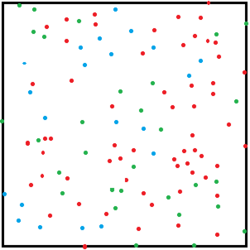Squares just got a whole lot serious
 If the average distance from a point randomly selected in the unit square to its center equals
c
ln
(
a
+
b
)
+
b
where
a
,
b
and
c
are positive integers with
b
being square-free. Find
a
+
b
+
c
.
If the average distance from a point randomly selected in the unit square to its center equals
c
ln
(
a
+
b
)
+
b
where
a
,
b
and
c
are positive integers with
b
being square-free. Find
a
+
b
+
c
.
The answer is 9.
This section requires Javascript.
You are seeing this because something didn't load right. We suggest you, (a) try
refreshing the page, (b) enabling javascript if it is disabled on your browser and,
finally, (c)
loading the
non-javascript version of this page
. We're sorry about the hassle.
1 solution
Nice solution!
Another (basically equivalent) way of framing this is:
- Split the grid into 4 squares.
- By symmetry, assume the point comes from the lower-left square.
- Then we just care about the distance from a point in a square to a vertex, rather than center.
- So, if (x,y) is a random point in the unit-square with lower-left vertex (0,0), the answer we want is simply 4 1 ⋅ E [ x 2 + y 2 ] , which then reduces to the integral you have.
As an extension, try to find the average distance from a point randomly selected in a unit cube to the center of the cube.
Let the unit square be centered on the origin. The right side of the square will be the line x = 2 1 . In polar form, this is r = 2 1 sec θ .
Now consider the triangle bound by the lines θ = − 4 π , θ = 4 π , and r = 2 1 sec θ . The area of this triangle is A = 4 1 .
The distance from the origin to any point on the triangle will be the value of r for that point. Without loss of generality, we can conclude that the average distance from the origin to a point in the triangle is the same as the average distance from the origin to any point in the unit square. We can calculate this average distance using the double integral:
A 1 − 4 π ∫ 4 π 0 ∫ 2 1 sec θ r d A
4 − 4 π ∫ 4 π 0 ∫ 2 1 sec θ r 2 d r d θ
6 1 − 4 π ∫ 4 π sec 3 θ d θ
This evaluates to 6 ln ( 1 + 2 ) + 2 .
a = 1 , b = 2 , and c = 6 . Therefore, a + b + c = 1 + 2 + 6 = 9 .